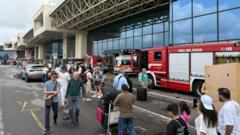Israel's military has begun plans for the evacuation of Gaza City amidst escalating violence and humanitarian concerns. Medical and aid agencies prepare for the influx of casualties, while residents and health officials express deep opposition to the proposed relocations, fearing for their safety and healthcare access.**
Escalating Tensions: Israel's Evacuation Plans for Gaza City Spark Outcry Amid Ongoing Violence**

Escalating Tensions: Israel's Evacuation Plans for Gaza City Spark Outcry Amid Ongoing Violence**
Israeli officials prepare for a strategic evacuation of Gaza City's one million residents as airstrikes intensify, prompting fierce opposition from local health officials and humanitarian organizations.**
Israel's military has issued urgent warnings to medical professionals and international aid organizations in preparation for the anticipated evacuation of Gaza City's residents, as part of a larger offensive aimed at securing control over the territory. Authorities have communicated that arrangements are being made to adapt hospitals in southern Gaza to manage incoming patients, emphasizing the importance of medical readiness for what they expect may be significant casualties.
However, officials from Hamas' health ministry strongly condemned any measures that might exacerbate the already critical condition of Gaza's health infrastructure. They argue that these plans threaten fundamental medical services for millions of residents. As Israeli forces have ramped up attacks in eastern Gaza City, the situation on the ground is escalating, with recent airstrikes claiming numerous civilian lives and causing widespread destruction.
Israeli Prime Minister Benjamin Netanyahu is engaged in consultations with military leaders to finalize strategies for the offensive, which has faced substantial backlash from both domestic and international communities, especially following failed ceasefire talks with Hamas last month. The plan includes relocating all of Gaza City's population to designated safety zones, despite assurances from the military about the creation of necessary medical facilities in the south.
Medical officials received communication from military personnel indicating that southern hospitals are being prepared for an influx of patients from Gaza City. However, critics argue that many facilities in the south are already operating well beyond their capacity, with dire consequences for those requiring urgent medical attention. The United Nations has echoed these sentiments, cautioning that a military offensive could lead to catastrophic humanitarian outcomes.
Reports from Gaza City describe scenes of devastation, with an increase in aerial bombardments leading to plenty of injuries and fatalities. Local journalist Motasem Dalloul has detailed the chaos, noting that residents are hesitant to abandon their homes amid the violence, with many choosing to face the potential risks rather than evacuate to uncertain safety zones.
Public sentiment appears to be against any further displacement, as crowds gathered in Gaza City to voice opposition to the ongoing military actions. Residents have expressed fatigue and desperation for an end to the violence, stressing a desire to remain in their homes rather than be uprooted.
Amidst these tensions, families of Israeli hostages held by Hamas continue to push for a ceasefire agreement that would facilitate the safe return of their loved ones. Mediators are reportedly working on a proposal aimed at a temporary truce, but the Israeli government has expressed skepticism about a piecemeal solution, insisting on a comprehensive deal addressing all hostages.
As the conflict unfolds, UN Secretary-General António Guterres has called for an immediate ceasefire, warning of the imminent humanitarian crisis that military actions could provoke. The growing hostilities are a direct response to earlier attacks by Hamas in southern Israel, and the toll in Gaza continues to rise with reported casualties now exceeding 62,000 since the outbreak of violence on October 7, 2023.





















